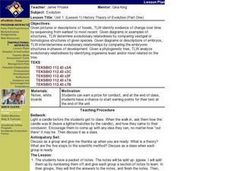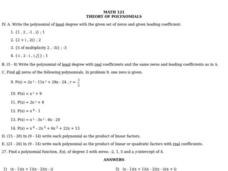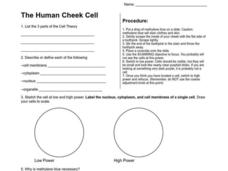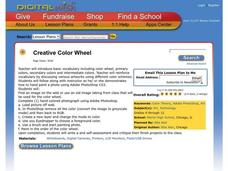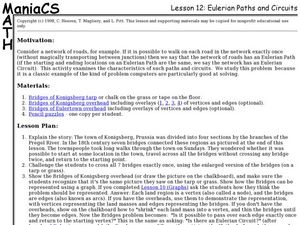Curated OER
History Theory of Evolution
Students identify fossils. They identify evidence of change over time when given pictures of fossils to determine the proper sequencing. In addition, they determine evolutionary relationships by comparing embryonic structures.
Curated OER
CONCEPTS IN NUMBER THEORY.
Students study the Maya culture and their achievements in mathematics, how bacteria grow exponentially, use rational numbers to convert back and forth between Celsius and degrees Fahrenheit, how some architectural designs are examples of...
Curated OER
Color Theory and Acrylic Painting
Pupils study color, acrylic painting and abstract art.
Curated OER
The Conceptual Theory of Chromatography
Learners conduct a lab to determine the best way to separate a variety of mixtures choosing between paper, thin layer and column chromatography. They use chromatography techniques to identify unknown substances and submit a lab report on...
Curated OER
Set Theory Review Using the TI Navigator
Learners use technology tools and resources for managing and communicating personal/professional information. They select and apply technology tools for research, information analysis, problem solving, and decision making in content...
Curated OER
Theory of Polynomials
In this polynomial activity, students find all zeros of polynomials. They write polynomials as the product of linear fractions. This two-page activity contains 27 problems. The second page provides answers.
Curated OER
Color Theory Unit: Tint & Shade Strips
Students create three tint and three shade strips which depict a gradual gradation from color to white and from color to black.
Curated OER
Color Theory Unit: Op Art Complementary Color Designs
Students learn skills in mixing and applying paint while enhancing understanding of complementary colors.
Curated OER
From Remus to Rap: A History in Theory and Practice of the African-American Storytelling Tradition
Students examine the specific form and function of tall tales and toasts.
They discover the importance of performance in the telling of a story and the importance of rhythm in the telling of toasts. They create stories of their own, in...
Curated OER
From Probability to Combinatorics and Number Theory
Middle schoolers see how division is used to help solve probability problems. They use tables as data structures where they are used to count outcomes and to compute probabilities. Students use games to help solve probability problems.
Curated OER
Behavior and Properties of Gases
Students convert Celsius to Kelvin temperature. Students conduct three lab experiments, gas law simulations using Internet applets, lectures and demonstrations. The Laws included are Boyle's, Charles, Combined Gas, Ideal Gas, and Gram's...
Curated OER
Hands-on Cells
Students review the components of a cell and the differences between plant and animal cells by creating a three-dimensional model of each type of cell. In small groups, they use modeling clay and household object to construct their models.
Curated OER
Music Theory - Intervals
Learners explore types of intervals containing major and minor sixths. While using Auralia computer software, they participate in a game to identify sharp and flat pitches. Afterwards, they identify the pitches by ear and listen to...
Curated OER
The Space Between
Students explore major, minor and perfect intervals and watch the PowerPoint presentation "The Space Between." They identify the various intervals by sight and differentiate major, minor and perfect intervals. Students perform the...
Curated OER
Music Theory
Students properly notate a short melody within a given framework. They pay much attention to rhythmic notation. Students compose and harmonize their own melodies. They work individually on composing a melody on their preferred...
Curated OER
Hybridization and Valence Bond Theory
In this chemistry worksheet, students use knowledge of valance bonds in order to answer the in depth application of science problems.
Curated OER
Elements of Music
In this music worksheet, students learn 6 elements of music and match the names with the definitions. The elements are silence, pitch, texture, duration, dynamics, tempo and attack and decay.
Curated OER
Subatomic Particles
In this atoms worksheet, students complete a graphic organizer comparing the properties of the 3 subatomic particles. Then students complete 1 short answer question.
Curated OER
Review Questions-Molecular Geometry and VSEPR Theory
In this molecular geometry and VSEPR worksheet, students find bond angles, hybridization, determine polarity and draw orbital box diagrams of molecules. They determine molecular geometry and bond angles of given molecules and determine...
Curated OER
The Human Cheek Cell
In this human cells worksheet, 7th graders complete a science experiment using human cheek cells. Students sketch the cells at high and lower power and label the cell nucleus, cytoplasm, and cell membrane.
Curated OER
Astronomy
In this astronomy worksheet, students find fifty one words in a word search that are related to comets, galaxies, planets, moons, stars and the tides.
Curated OER
A Melody Activity
Students explore melody. In this music lesson, students define "melody" and identify the melody line present in increasingly complex musical pieces. Students sing or hum the melody line after listening to an excerpt of music.
Curated OER
Creative Color Wheel
Students explore graphic design by using color wheels to color images. In this art analysis instructional activity, students utilize Adobe Photoshop to experiment with coloring old images and removing all color as well....
Curated OER
Eulerian Paths and Circuits
Students explore the concept of euler paths and circuits. In this euler paths and circuits lesson, students discuss the bridges of Königsberg problem. Students discuss how to determine if an euler circuit exists. Students discuss the...
Other popular searches
- Number Theory
- Music Theory
- Atomic Theory
- Cell Theory
- Big Bang Theory
- Color Theory
- Economic Theory
- Music Theory Lesson Plans
- Theory of Evolution
- Germ Theory
- Continental Drift Theory
- Cell Theory Scientists


